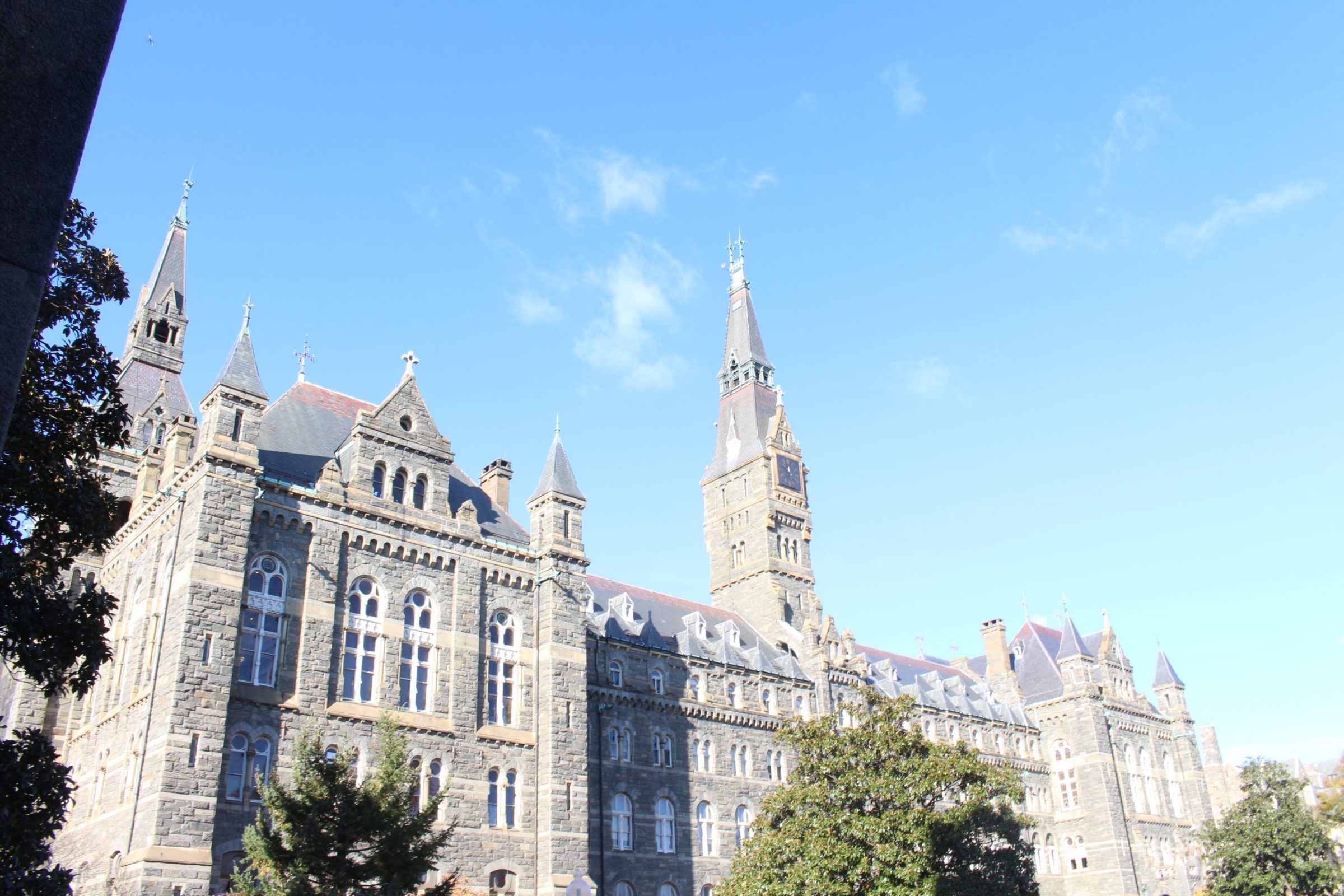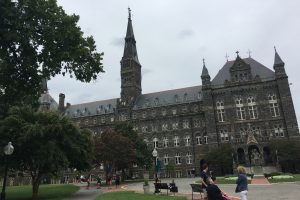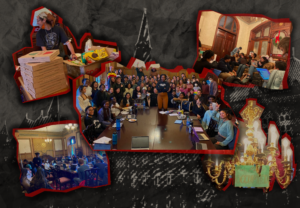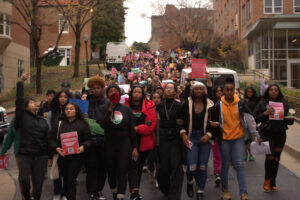Content warning: This article discusses instances of oppression of Black individuals.
Georgetown’s School of Foreign Service is committed to the inclusion of global anti-racism as a core principle, according to an email sent by Dean Joel Hellman on June 17.
Hellman’s email was a response to a call for action that began circulating among SFS students and faculty earlier in June, which called for the SFS to affirm its commitment to racial justice in light of continued protests in response to the police killing of George Floyd and Breonna Taylor, which many Georgetown students have participated in. Signed by 125 faculty members and 730 students and alumni before it closed, including the SFS Undergraduate Academic Council, the document asked the school to reflect on racism within its curriculum.
“I was actually very pleased to receive the call because one of the things that I’m most concerned about is thinking about what the SFS needs to do and how the SFS can do better but by doing it more organically from within the community,” Hellman said. “The community coming together and saying we’re concerned about it, we think SFS needs to do more and we are willing to do the work to come up with some concrete ideas, to me was just exactly what I hoped.”
For Varsha Menon (SFS ’21), the call to action was important in ensuring Georgetown acts on the series of statements of solidarity with Black students and students of color the university has made in the past few weeks.
“With everything that’s going on right now, and as a woman of color, it’s really important for me that Georgetown, when they release solidarity statements, that they put their words into action,” Menon said.
“I want to hold the university accountable whenever they say they stand with Black lives or they are committed in this fight against global racism.”
Anti-racism, which is central to the petition, refers to a set of actions that actively oppose racism. The term has entered the consciousness of many white Americans in recent weeks and peaked in its google searches on June 2.
Gustav Gulmert (SFS ’22) has found himself explaining this concept often. Gulmert attended a predominantly white high school, though his friend group was largely African American. Gulmert occupies predominantly white spaces at Georgetown. This has had the effect of making him a de facto point of contact for friends to ask about racism and how to be anti-racist. “I have always seen myself in circles where I am sometimes the only to one of a few Black faces,” he said.
These white spaces, such as the SFS, must institute ways to reflect on the role of racism in society, Gulmert thinks. “Committing to anti-racism as a core principle, and also realizing how the principles of our society today, first it was based off slavery, then it was based off segregation, and then it was based off keeping the structure of our society right now,” Gulmert said.
Though the petition included specific recommendations for areas in which the school could practice anti-racism, such as confronting Georgetown’s own history with slavery and how whiteness impacts the curriculum, admissions, hiring practices, and administrative decisions of the school, Hellman’s email did not include any concrete plans for changes.
Instead, Hellman focused on supporting the goals of the petition and acknowledging the importance of anti-racist work. He echoed these sentiments on the phone. “We all begin with a starting point that the SFS hasn’t done enough,” he said.
Since his email, Hellman said, he has received several proposals from students, as well as from the ad-hoc group that helped execute the call to action. These proposals covered a range of topics, including hiring, the curriculum, and admissions.
Menon, who has seen a majority-white student and faculty population in her three years in the SFS, thinks including more academics of color in the Government department and SFS courses is key to making sure these conversations occur in the classroom. “A lot of the ways [students] are introduced to IR is through white professors and I think that’s a problem, that if you’re committed to fighting global racism that you actively encourage this dialogue with academics of color,” she said.
Hellman recognized that part of this was not just bringing people of color into the university, but creating a welcoming environment. “It’s one thing to increase the numbers and share in the community but then not to create the conditions for success,” he said.
Menon also hopes that race and global racism will be incorporated into more classes as a core element of the syllabus, rather than just a one-day discussion as she has seen in the past. In her International Relations class, students spent one day discussing how most theories of international relations were developed by white academics, but she felt this recognition should be incorporated into every discussion.
“When we talk about development or conflict, a lot of these things involve people of color, so why are we spending one day talking about how there’s not racial diversity in various academic lines of thought when really it should be every lecture because race plays a role constantly?” Menon asked.
Gulmert is hoping for bigger change—the addition of an SFS core class focused on the effects of segregation and slavery, the creation of the current criminal justice system, and the history of police, which is largely tied with slavery. Making this class mandatory, he thinks, is crucial for graduating students to have a true background in and understanding of racial justice. “That information is more important than a foreign language, that information is more important for any member of society,” Gulmert said.
Discussions about a course similar to the one Gulmert suggested are happening with deans of all the schools, according to Hellman. He also suggested there could be space for a specific discussion on global anti-racism, either as part of the freshman proseminar or as a separate SFS course.
“There’s quite a number of voices that are calling for a space in the curriculum that is more well defined and more focused on the problems of global anti-racism or that even draws on Georgetown’s own experience,” Hellman said.
Menon sees applicability of the petition in the NHS as well, especially in light of current stark disparities in health outcomes between white people and people of color. “People of color have been impacted by the American health care system where they aren’t believed whenever they come with complaints,” Menon said, referencing a prevalent but incorrect notion stemming from slavery that that Black people can tolerate higher levels of pain than white people. “People of color, especially Black, Indigenous, and Latinx people are being disproportionately impacted by COVID, and also destigmatizing a lot of these thoughts that people have about people of color and healthcare.”
This disparity in health care also has a history rooted in racism, Gulmert pointed out. Drug trials such as the Tuskegee syphilis experiment subjected Black individuals to medical experimentation and bioethics were initially developed with racial connotations.
The SFS has been engaged in an ongoing effort with other major international relations schools to discuss greater diversity, according to Hellman. Though the collaboration is in its early stages, many of the proposals he has seen so far mirror suggestions that were made by the writers of the petition. Part of this is reckoning with the problem international affairs schools face across the country, where students are often recruited out of the same high schools each year.
Though the SFS has been working to increase diversity in faculty hiring and providing financial support to make Georgetown a realistic option for students of color, Hellman feels the current political situation calls for more.
“This just brings us to a whole new level and I think that’s a level we need to be on.”
As proposals continue to be submitted, Hellman said meetings will begin with the ad-hoc working group. He also hopes to develop an online platform where people can comment on or react to existing proposals, and add their own.
Menon hopes part of this process will be listening to students of color in the SFS and their experiences. “I hope that the SFS, in their fight against global racism and being more inclusive about that in their curriculum, is engaging with their students of color and looking at how they want to see that be presented and how they want to engage in that dialogue,” she said.
Hellman acknowledged the importance of Black voices in the conversation, though said he did not want to place the burden to produce solutions solely on students and faculty of color, though a fair number of them have reached out.
“I don’t want to make anyone feel that this is their obligation to carry that burden for the rest of the community so I want to create this space where students can engage and my deep and sincere hope is that students of color and faculty of color are willing to engage,” Hellman said.
It is not just up to faculty and institutions to promote this inclusivity, Gulmert stressed, referencing the questions he receives from peers on how to be anti-racist.s. “The answer to that is to have friends and personal connections with people it does impact and actively call out behavior that you know you wouldn’t do if someone else was in that conversation, if someone else was in that room.”
“We have to take a step back and focus on how racial justice needs to be implemented and how we can create policies that implement all of us with equity, not just equality, ” Gulmert said.
This article has been updated to reflect Gulmert’s school make-up.







[…] professors submitted the informational document to the newly formed ad hoc SFS Faculty Council Working Group on […]